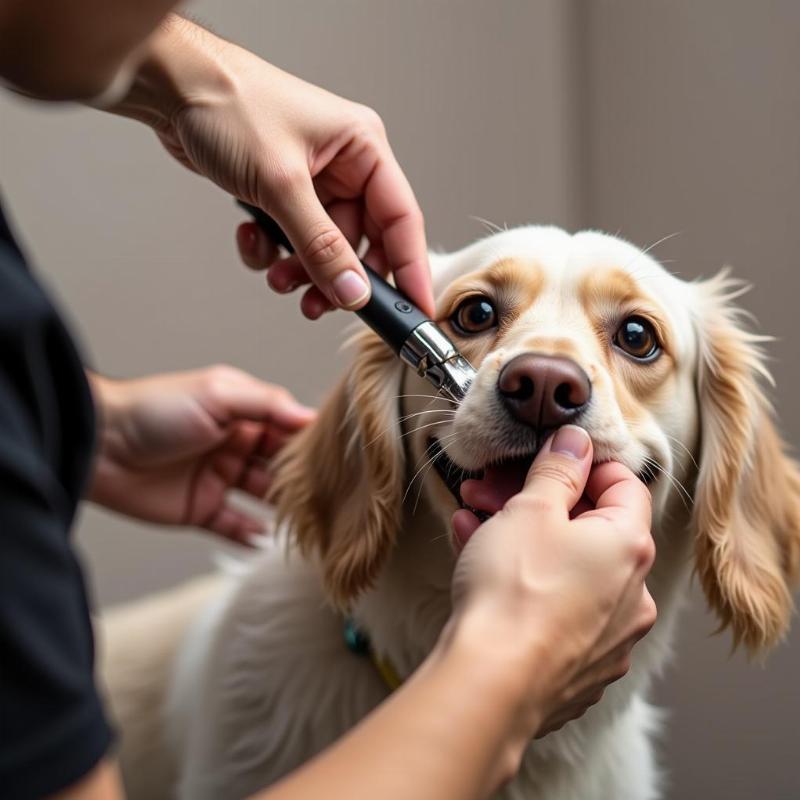If you’ve noticed hair protruding from your dog’s backside, you’re not alone. This is a common concern among dog owners in the US, and it can range from a simple cosmetic issue to a sign of an underlying health problem. This article will explore the various reasons why your dog might have hair hanging out of his bum, offer solutions, and guide you on when to seek veterinary care.
Understanding the Causes of Hair Around Your Dog’s Anus
Several factors can contribute to hair hanging out of your dog’s bum. Identifying the root cause is crucial for effective treatment and prevention. Let’s delve into some of the most common reasons:
Long Hair and Matting
Long-haired breeds, such as Golden Retrievers and Yorkshire Terriers, are more susceptible to hair accumulating around their anus. If not regularly groomed, this hair can become matted and tangled, trapping fecal matter and leading to hygiene issues.
Dingleberries
“Dingleberries,” small pieces of dried feces clinging to the hair around the anus, are a common and often humorous problem. While usually harmless, they can be uncomfortable for your dog and cause hygiene concerns.
Anal Gland Issues
Located on either side of your dog’s anus, the anal glands express a foul-smelling fluid during bowel movements. If these glands become impacted or infected, it can lead to discomfort, swelling, and even abscesses. Hair around the anus can exacerbate these issues by trapping bacteria and secretions.
Dietary Factors
A diet lacking in fiber can lead to softer stools, increasing the likelihood of fecal matter clinging to the hair around the anus.
Addressing the Issue: Grooming and Hygiene
Regular grooming is paramount in preventing hair from accumulating around your dog’s anus. Here’s a breakdown of recommended grooming practices:
- Regular Brushing: Brush your dog’s coat regularly, paying particular attention to the hair around the rear. This will help prevent matting and tangles.
- Trimming: For long-haired breeds, trimming the hair around the anus is essential. This can be done at home with clippers or by a professional groomer.
- Cleaning: Regularly clean the area around your dog’s anus with a pet-safe wipe or warm, damp cloth.
 Chó được chải lông vùng hậu môn
Chó được chải lông vùng hậu môn
When to Seek Veterinary Care
While hair hanging out of your dog’s bum can often be managed with proper grooming, certain situations warrant a visit to the vet:
- Excessive Licking or Scooting: This could indicate anal gland problems or other irritations.
- Swelling or Redness: These signs could suggest an infection or abscess.
- Bloody or Foul-Smelling Discharge: These are indicative of more serious health issues.
- Changes in Bowel Movements: Consult your vet if you notice any changes in your dog’s stool consistency or frequency.
Conclusion
Addressing hair hanging out of your dog’s bum often involves regular grooming and maintaining good hygiene. However, it’s crucial to monitor for signs of underlying health issues. By being proactive and observant, you can ensure your furry friend stays comfortable and healthy.
FAQ
- How often should I groom my dog’s rear end? This depends on the breed and hair length. Long-haired breeds may require weekly trimming and cleaning, while short-haired breeds may only need occasional attention.
- Can I express my dog’s anal glands myself? While possible, it’s generally recommended to have a veterinarian or groomer perform this procedure, as it can be uncomfortable for your dog if done incorrectly.
- What type of diet is best for preventing dingleberries? A diet rich in fiber can help firm up your dog’s stool, reducing the likelihood of dingleberries.
- What are the signs of impacted anal glands? Signs include excessive licking or scooting, swelling around the anus, and a foul odor.
- Is it normal for my dog’s anal glands to express occasionally? Yes, it’s normal for anal glands to express during bowel movements. However, frequent or excessive expression could indicate a problem.
- What should I do if my dog has an abscess near his anus? Consult your veterinarian immediately, as abscesses require prompt medical attention.
- Can allergies cause hair loss around the anus? Yes, allergies can lead to skin irritation and hair loss in various areas, including around the anus.
Beautdogs.us is your premier resource for all things dog-related in the US. We offer expert advice on dog breeds, grooming, health, and overall well-being, catering to both new and experienced dog owners. Whether you’re seeking breed-specific information or general care tips, Beautdogs.us provides trustworthy and comprehensive resources. Contact us today for personalized guidance and support! Email: [email protected], Phone: +1 501-555-7529. Visit us at Beautdogs.us.